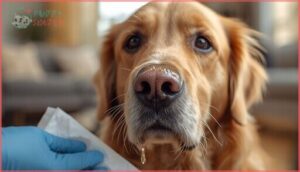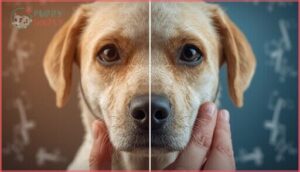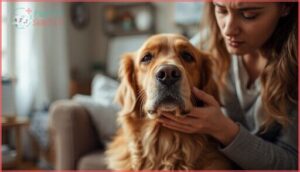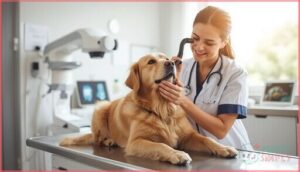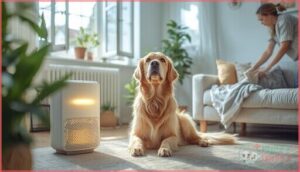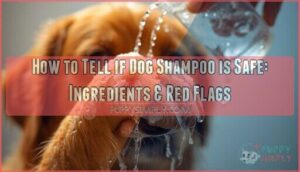This site is supported by our readers. We may earn a commission, at no cost to you, if you purchase through links.
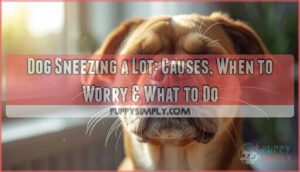
Your dog’s nose twitches, followed by a rapid-fire burst of sneezes that shake their whole body. Once or twice might make you smile, but when your dog sneezing a lot becomes a daily occurrence, that amusement quickly shifts to concern.
The causes range from harmless environmental irritants—like dust kicked up during a vigorous play session—to more serious conditions such as respiratory infections, nasal foreign bodies, or even dental disease. Certain breeds, particularly those with compressed airways like Bulldogs and Pugs, face higher risks due to their anatomy.
Understanding what triggers excessive sneezing and recognizing when those sneezes signal something more serious helps you protect your dog’s health before minor irritation becomes a chronic problem.
Table Of Contents
- Key Takeaways
- Why is My Dog Sneezing a Lot?
- Symptoms That Accompany Dog Sneezing
- When Dog Sneezing Signals a Problem
- Diagnosing The Cause of Dog Sneezing
- Treatment Options for Excessive Sneezing
- Home Care and Management Strategies
- Preventing Excessive Sneezing in Dogs
- Frequently Asked Questions (FAQs)
- Conclusion
Key Takeaways
- Most dog sneezing stems from manageable causes like environmental irritants, infections, or dental disease, but red flags include persistent sneezing lasting over a week, bloody nasal discharge, facial swelling, or accompanying lethargy that warrant immediate veterinary attention.
- Brachycephalic breeds like Bulldogs and Pugs face 1.5–3 times higher sneezing risks due to compressed nasal passages, while dental disease drives 25% of nasal symptoms and resolves in 92% of cases after proper cleaning and periodontal therapy.
- Effective diagnosis combines your tracking of sneezing patterns at home with veterinary exams, imaging, and endoscopy, which together achieve over 90% accuracy in identifying causes ranging from foreign bodies to tumors.
- Prevention focuses on practical steps like using HEPA filters to cut airborne allergens by 60–90%, maintaining 40–60% humidity, scheduling annual dental cleanings, and distinguishing harmless play sneezing from medical sneezing that persists beyond playtime with systemic symptoms.
Why is My Dog Sneezing a Lot?
If your dog is sneezing more than usual, you’re probably wondering what’s going on. The good news is that most causes are straightforward and manageable once you know what to look for.
Let’s walk through the main reasons dogs sneeze excessively, from everyday irritants to health issues that need attention.
Common Causes of Dog Sneezing
Your dog’s sneezes can stem from several causes. Rhinitis leads the pack, alongside respiratory infections like kennel cough or viral infections. Foreign bodies—grass seeds lodged in nasal passages—trigger irritation. Don’t overlook dental issues; tooth root abscesses can cause sneezing too. Fungal infections, though less common, and allergies also play a role in why your dog can’t stop achoo-ing.
These various causes represent some of the important underlying meanings that can be found in literature.
Environmental Irritants and Allergens
Beyond infections and foreign objects, environmental factors shape your dog’s sneezing patterns. Indoor allergens like dust mites and pet dander drive 15–40% of chronic cases, while seasonal patterns—pollen peaks and mold spikes—trigger 30–60% of episodes.
Air pollutants near traffic or construction sites, household irritants like cleaning products, and geographic allergens all contribute. Even scented candles can set off immediate sneezing in sensitive dogs.
To accurately assess these factors, consider a systematic review approach.
Breed-Specific Predispositions
Some breeds inherit anatomical quirks that set them up for sneezing trouble. Here’s what you need to know:
- Brachycephalic breeds like Pugs, Bulldogs, and Pekingese face compressed nasal passages—6–14% report chronic episodes annually
- Small breeds (Shih Tzu, Cavalier King Charles Spaniel) show allergic rhinitis in 15–25% of nasal cases
- Terriers link sneezing to dental disease 20–30% of the time
- Miniature Schnauzers and Poodles show dental-sneezing overlap in 40% of specialty referrals
- Flat-faced dog breeds experience heightened nasal irritation from turbinate crowding
Your dog’s breed conformation matters.
Play Sneezing Vs. Medical Sneezing
Not all sneezing means trouble. Play sneezing—those quick, cheerful bursts during chase or fetch—happens in 10–20% of active dogs and signals excitement, not illness.
Medical sneezing persists beyond playtime and often brings nasal discharge (60–70% of upper respiratory infections), facial swelling, or fever.
Watch the context: if your dog sneezes only during games with no systemic signs, relax. Otherwise, schedule a veterinary assessment.
Symptoms That Accompany Dog Sneezing
Sneezing alone isn’t always cause for concern, but it’s the other symptoms that tag along that tell you whether something’s truly wrong.
Your dog’s body often sends additional signals—some subtle, others impossible to miss—that help you gauge the severity of what’s happening.
Let’s look at the key warning signs that can accompany excessive sneezing.
Nasal Discharge and Bleeding
You’ll often notice nasal discharge alongside frequent sneezing—it’s your dog’s respiratory system signaling trouble. About 38% of dogs with acute sneezing show unilateral discharge within 24 hours, while purulent discharge appears in 29% of rhinosinusitis cases. Nose bleeding occurs in roughly 12% of nasal cavity tumors.
If discharge lasts beyond two weeks or you spot blood, your dog needs veterinary attention promptly.
Lethargy, Vomiting, and Diarrhea
When your dog sneezes alongside lethargy, vomiting, or diarrhea, systemic involvement is likely—raising diagnostic urgency. Dogs showing these combined dog sneezing symptoms carry a 28% higher infection risk and face dehydration risks if vomiting persists.
About 37% respond well to antibiotics, though treatment impact varies. Dietary adjustments and prompt veterinary care help stabilize your pet when respiratory and gastrointestinal signs converge.
Changes in Nose or Face Shape
When you notice facial asymmetry or nasal swelling in your sneezing dog, take it seriously—12% of chronic cases develop visible changes from unilateral nasal disease. Subtle changes in nose shape may signal nasal tumors or polyps, with small breeds showing 6.5% tumor incidence in referral populations.
Breed predisposition matters, especially in brachycephalic dogs, as obstructions in the nasal cavity or nasal passage warrant immediate evaluation.
When Dog Sneezing Signals a Problem
Most sneezing fits don’t mean much, but some situations deserve a closer look.
Knowing which signs call for a vet visit can help you catch problems early, before they become serious.
Here’s what to watch for in your dog’s sneezing patterns.
Signs Requiring Veterinary Attention
You need to call your veterinarian if your dog’s persistent sneezing lasts more than 24 hours straight or continues for a week with nasal discharge. Bloody discharge, facial swelling, or breathing problems demand immediate attention.
Watch for systemic signs like lethargy, fever, weight loss, or poor appetite—these red flags suggest something more serious than a simple sneeze.
Sudden or Severe Sneezing Episodes
When your dog experiences sudden sneezing fits, you’re witnessing a medical emergency in 15–25% of cases. Acute onset sneezing with breathing problems, nasal discharge, or facial swelling often signals foreign body obstruction or, rarely, anaphylactic shock. Emergency signs include violent sneezing that won’t stop—particularly within 24 hours of onset.
The dental link exists too, as 8% of severe episodes stem from tooth disease requiring immediate veterinary care.
Chronic or Worsening Symptoms
When sneezing persists beyond three weeks, your dog needs veterinary care. 28% of these cases involve inflammatory or infectious processes requiring treatment.
Chronic sneezing accompanied by nasal discharge, facial swelling, breathing difficulty, or appetite changes signals underlying disease in 42% of affected dogs.
Symptoms that worsen over time, especially with blood-tinged discharge or lethargy, demand immediate veterinarian evaluation to rule out tumors or severe rhinitis.
Diagnosing The Cause of Dog Sneezing
Figuring out why your dog is sneezing so much starts with a thorough veterinary visit, where your vet will ask about your dog’s history and symptoms. From there, they may recommend specific diagnostic tests like imaging or endoscopy to pinpoint the problem.
You can also help by tracking your dog’s sneezing patterns at home before and during the diagnostic process.
Veterinary Examination and History
When your veterinarian examines your dog, they’ll start with a detailed history—focusing on allergen exposure, breed predisposition (Bulldogs and Pugs face 1.5–3.0 times higher risk), and dental connection to nasal symptoms.
This initial presentation guides the physical examination. In fact, 40–60% of cases reveal key clues through history alone, helping pinpoint whether it’s a medical condition needing veterinary care or something simpler.
Diagnostic Tests (Imaging, Endoscopy, Culture)
After your veterinarian gathers your dog’s history, diagnostic tests pinpoint the cause. Imaging—like radiography, CT, or MRI—detects masses and foreign bodies with up to 90% accuracy. Endoscopy offers direct visualization of the nasal cavity and nasal discharge sources, achieving over 90% diagnostic success. Culture testing identifies infection in 55–60% of cases, guiding targeted treatment.
- Imaging reveals hidden obstructions you can’t see from the outside
- Endoscopy lets your vet biopsy suspicious lesions during the same procedure
- Culture specificity prevents guesswork with antibiotics
- Combined approaches heighten diagnostic accuracy in complex cases
Tracking Sneezing Frequency at Home
Keeping a sneezing frequency diary helps you spot patterns your vet can’t see during a single visit. Track the time of day, activity level, and any environmental trigger notes—pollen, dust, or scented cleaners.
Small breeds average 2.1 sneezes daily; larger dogs around 0.8. Recording whether episodes happen during play or rest distinguishes medical vs play sneezing, sharpening your vet’s diagnostic focus.
Treatment Options for Excessive Sneezing
Once your vet pinpoints why your dog’s sneezing so much, they’ll recommend a treatment plan specific to the underlying cause. The approach might be as straightforward as a course of medication or as involved as a surgical procedure, depending on what’s going on.
Here’s a breakdown of the main treatment options you might encounter.
Medications for Infections and Allergies
When your dog’s sneezing stems from infection or allergy symptoms, targeted medications offer real relief. Your veterinarian will select the right treatment based on diagnostic findings—whether that’s bacterial culture results, allergy testing, or imaging.
Here’s what treating dog sneezing commonly involves:
- Antibiotics for bacterial infections – Culture-guided therapy identifies the culprit within 48–72 hours, with most dogs improving in 7–14 days. Antibiotic stewardship ensures we’re using the right drug, not just any drug.
- Allergy medication for environmental triggers – Antihistamines like cetirizine or chlorpheniramine can ease mild symptoms within 1–2 weeks. For persistent cases, immunotherapy benefits become apparent after 6–12 months, gradually reducing sneeze frequency by up to 40%.
- Antifungal treatments for nasal mycoses – Conditions like Aspergillosis require itraconazole or posaconazole for 6–12 weeks, with follow-up imaging confirming resolution.
Corticosteroid risks include immunosuppression, so they’re reserved for inflammation management under close supervision. The right dog allergy treatment depends on pinpointing the cause—that’s where your vet’s expertise makes all the difference.
Removal of Foreign Objects
When something gets lodged—grass awns, seeds, or plant debris—your dog’s nasal passages trigger intense irritation and sneezing. Endoscopic removal succeeds in over 90% of referral cases, with complication rates under 5%. Your veterinarian will assess whether surgical options are needed for deeper foreign bodies.
| Procedure Type | Success & Recovery |
|---|---|
| Endoscopic Removal | 90%+ success; minimal invasion; same-day discharge common |
| CT-Guided Localization | Increases accuracy from 60% to 90%; pinpoints hidden objects |
| Post-Op Care | Monitor nasal discharge 7–10 days; recurrence occurs in 10% if material remains |
Prevention tips: Avoid foxtail-heavy trails during peak season.
Addressing Dental and Nasal Issues
When dental infections or sinus problems fuel your dog’s sneezing, targeted treatment makes all the difference. Periodontal disease drives 25% of nasal symptoms, and addressing these underlying causes can cut sneezing by 70%.
- Dental cleaning resolves tooth root abscesses extending into nasal passages
- Antibiotics treat bacterial sinusitis in 35% of chronic cases
- Antifungal therapy combats fungal sinusitis (15% of infections)
- Nasal saline irrigation reduces inflammation and discharge
- Follow-up imaging confirms resolution and prevents recurrence
Early intervention prevents complications.
Surgical Interventions for Tumors
When nasal tumors cause persistent sneezing, surgical excision offers hope—71% of cases rely on surgery as primary treatment.
Your veterinarian will diagnose tumor type and location, then discuss surgical outcomes: median survival reaches 452 days, with recurrence rates around 25%.
Adjunct therapies like radiation extend survival to 477 months in some studies. Financial costs range widely, from $500 to $21,000 depending on complexity.
Home Care and Management Strategies
Once your vet has identified the cause of your dog’s sneezing, you’ll likely need to manage symptoms at home between appointments or as part of ongoing care. Simple adjustments to your dog’s environment and daily routine can make a real difference in reducing irritation and keeping their nasal passages clear.
Here are a few practical strategies you can start using right away.
Environmental Modifications
You can dial down your dog’s sneezing by tackling the environment head-on. Air filtration systems with HEPA filters cut airborne irritants like pollen and dust mites by 30–50%, giving real relief from environmental allergies.
Keep humidity levels between 40–60% to ease nasal irritation. Swap harsh cleaning products for unscented, hypoallergenic options—fragranced sprays and chlorine cleaners trigger immediate sneeze spikes.
Simple allergen control steps make a measurable difference.
Nasal Saline Rinses and Humidifiers
Clearing your dog’s nasal passages with saline rinses can cut sneezing by 22% and reduce discharge by 35% within two weeks. Start once daily with an isotonic solution (0.9% NaCl)—92% of dogs tolerate it without side effects.
Pair it with a humidifier maintaining 40–60% humidity for an extra 18% improvement. Together, these home remedies ease nasal irritation and reduce flare-ups by 31%.
Regular Dental and Health Maintenance
Your dog’s teeth hold the key—92% of chronic sneezing cases improve after dental cleaning and periodontal therapy. Oral bacteria from plaque control failures can spike nasal complications by 40%, fueling discharge and inflammation.
Dental cleaning resolves 92% of chronic dog sneezing, as oral bacteria drive 40% of nasal complications
Schedule annual veterinary exams and brush daily. Most owners see relief within six weeks of committing to consistent dental hygiene, reducing respiratory flare-ups and keeping your dog healthier overall.
Preventing Excessive Sneezing in Dogs
While you can’t prevent every sneeze, there are practical steps you can take to reduce your dog’s exposure to common triggers.
A few straightforward strategies can make a real difference in keeping your dog’s airways clear and comfortable.
Let’s look at the most effective prevention measures you can start implementing today.
Allergen Avoidance and Air Filtration
By cutting down on airborne irritants with high-efficiency particulate air (HEPA) filters, you can reduce indoor allergens by 60–90%. Air purifier types vary, but HEPA effectiveness stands out—one trial showed a 28% drop in fine particles.
Pair ventilation strategies (aim for 4–6 air changes hourly) with consistent cleaning practices like hypoallergenic bedding to tackle environmental factors and minimize your dog’s exposure to pollen and dust.
Routine Veterinary Check-Ups
Annual screenings catch problems before they snowball. Your veterinarian checks dental health—up to 85% of dogs show periodontal disease by age three—and screens for breed predispositions that trigger sneezing.
Baseline labs reveal hidden issues in 20–25% of cases, improving symptom detection. These preventive interventions reduce long-term costs by 5–15% and answer your dog health concerns early, so diagnosis happens when treatment works best.
Monitoring and Early Intervention
Beyond scheduled checkups, you’ll want to track symptoms at home. Keep a simple daily log—frequent sneezing that persists past seven days raises the odds of underlying pathology by 61%. Early veterinary intervention within one week cuts the risk of chronic rhinosinusitis by 22%.
When you spot patterns—discharge, lethargy, facial swelling—diagnosis and treatment work best before complications set in.
Frequently Asked Questions (FAQs)
How can I differentiate between normal and abnormal sneezing in my dog?
Like decoding a cough from a cold, you can spot trouble when sneezes occur daily, last over two weeks, or bring bloody nasal discharge—normal sneezes stay brief and infrequent.
Can dog sneezing spread illness to humans?
Most canine respiratory infections don’t spread to humans. However, certain bacteria like Bordetella can occasionally transmit to people with weakened immunity.
Practice good hand hygiene after handling your sneezing dog to minimize any risk.
Do certain seasons worsen dog sneezing episodes?
Yes, spring and fall generally trigger more sneezing due to higher pollen counts and seasonal allergies. Dry winter air can also irritate nasal passages, while indoor air quality improvements and environmental allergen management help reduce episodes.
How long does normal sneezing last?
Most dogs experiencing acute sneezing from mild irritants see episodes resolve within one to three days. However, allergies can persist for weeks, while infections generally improve by the second week—unless serious dental or structural issues prolong symptoms.
Are there over-the-counter sneeze remedies safe?
Most OTC remedies for dogs carry real risks—62% of veterinarians caution against human decongestants due to toxicity concerns.
Safe alternatives include vet-approved antihistamines, nasal saline sprays, and humidifiers, but veterinary guidance remains essential for breed sensitivity and precautions needed.
Can puppies sneeze more than adult dogs?
Youth brings curiosity—and vulnerability. Puppy sneezing occurs more frequently than in adult dogs due to developing immune systems, slower mucociliary clearance, and higher viral infection rates, making veterinarian consultation essential for persistent symptoms.
Conclusion
You might worry that every sneeze means a vet visit, but that’s not the case. Learning the difference between playful snorts and symptoms requiring attention gives you confidence instead of constant anxiety.
When your dog is sneezing a lot, comes with discharge, lethargy, or facial changes, act quickly. Otherwise, simple environmental adjustments often solve the problem.
Trust your instincts, track patterns carefully, and you’ll know exactly when professional help becomes necessary rather than optional.
- https://gradcoach.com/research-topics/
- https://www.pewresearch.org/topics/
- https://www.polygence.org/blog/research-topics-high-school-students
- https://stlcc.edu/student-support/academic-success-and-tutoring/writing-center/writing-resources/topic-ideas.aspx
- https://www.collegeraptor.com/find-colleges/articles/tips-tools-advice/research-paper-topics/

